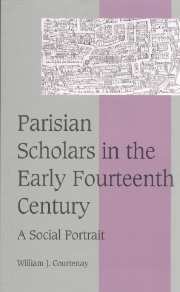Book contents
- Frontmatter
- Contents
- List of maps and figures
- Preface
- List of abbreviations
- INTRODUCTION: PARIS IN 1329
- Part I The recovery and context of a document
- Part II A window on a lost world
- Part III Biographical register
- Select bibliography
- Index of persons and places
- Subject index
- Cambridge Studies in Medieval Life and Thought Fourth series
INTRODUCTION: PARIS IN 1329
Published online by Cambridge University Press: 17 August 2009
- Frontmatter
- Contents
- List of maps and figures
- Preface
- List of abbreviations
- INTRODUCTION: PARIS IN 1329
- Part I The recovery and context of a document
- Part II A window on a lost world
- Part III Biographical register
- Select bibliography
- Index of persons and places
- Subject index
- Cambridge Studies in Medieval Life and Thought Fourth series
Summary
The choice of the academic year 1329–30 as a point in time for examining the university community at Paris in the early fourteenth century was determined by the date of the document on which this study is based. Yet that date is fortunate inasmuch as that year and the academic generation to which it belongs coincided with several important transformations in the political, religious, and intellectual life of Paris.
On the political level this was the beginning of a new era in France. Although the full implications were probably not yet apparent, the Capetian dynasty came to an end in 1328 with the death of Charles IV and the crown passing to Philip of Valois. The attitude of the monarch toward the university, collectively and individually, mattered considerably: the university was located on the doorstep of the royal court and Parlement, it depended on the king for protection of its privileges and persons, the royal court and episcopal households were potential sources of employment and career advancement, and some clerks in the royal household or administration were simultaneously students at the university. Moreover, although a number of royal clerks who had served under Philip V and Charles IV were retained in royal service, Philip VI brought into the court his own followers who had served him before his accession to the throne. Thus, the network of contacts that connected university and court had been reconfigured, and some personnel with whom university officers had to deal had changed as well.
- Type
- Chapter
- Information
- Parisian Scholars in the Early Fourteenth CenturyA Social Portrait, pp. 1 - 6Publisher: Cambridge University PressPrint publication year: 1999



